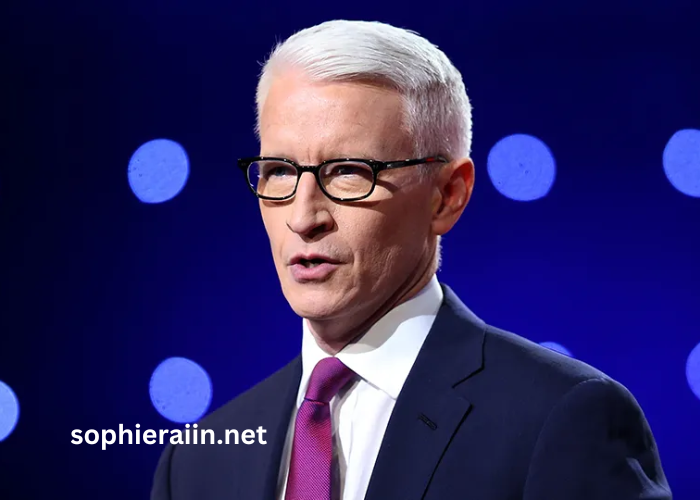Anderson Cooper has established himself as one of the most trusted and respected voices in journalism. Over the past few decades, he has covered some of the most significant events in modern history, from natural disasters to political upheavals, earning a reputation for his integrity, empathy, and unwavering commitment to the truth. This article explores how Anderson Cooper rose to prominence, his unique approach to reporting, and the qualities that have made him a trusted figure in news media.
Early Life and Background
Born on June 3, 1967, in New York City, Anderson Hays Cooper was raised in a family with deep roots in American history. His mother, Gloria Vanderbilt, was a renowned fashion designer and socialite, while his father, Wyatt Emory Cooper, was a writer.
Despite his privileged upbringing, Anderson experienced profound loss early in life, with the death of his father when he was just 10 years old, and later, the suicide of his older brother, Carter Vanderbilt Cooper. These experiences profoundly shaped Anderson’s outlook on life and fueled his desire to seek out the truth and connect with people from all walks of life.
Education and Early Career
Anderson Cooper attended Yale University, where he majored in political science. After graduating in 1989, he sought a career in journalism, despite having no formal training in the field. His first job was as a fact-checker for Channel One, a news program aimed at high school students.
Dissatisfied with the lack of opportunities, Anderson decided to take matters into his own hands. He borrowed a video camera, forged a press pass, and traveled to Myanmar to document the political unrest. This experience marked the beginning of his career as a war correspondent and set the tone for his future reporting style—immersive, fearless, and deeply committed to telling the stories that matter.
Anderson Cooper’s Rise to Prominence
Anderson Cooper’s big break came when he joined ABC News as a correspondent in 1995. His work covering major global events, such as the genocide in Rwanda and the death of Princess Diana, helped him build a reputation as a journalist who was willing to go to the heart of the story, no matter the danger or difficulty. In 2001, he joined CNN, where his career would truly take off.
His coverage of the September 11 attacks, the war in Afghanistan, and the Iraq War solidified his position as a leading voice in American journalism. Anderson’s ability to report with both clarity and compassion quickly made him a household name.
The Birth of “Anderson Cooper 360°”
In 2003, CNN launched “Anderson Cooper 360°,” a news program that would become synonymous with Cooper’s brand of journalism. The show was unique in its format, combining hard news with human interest stories, and offering in-depth analysis of complex issues. Anderson’s hands-on approach, often reporting live from the scene of major events, set the program apart from other news shows.
“Anderson Cooper 360°” became a platform where viewers could rely on comprehensive coverage delivered with integrity and empathy. The show’s success further cemented Anderson’s reputation as a trusted journalist, and it remains a staple of CNN’s programming to this day.
Hurricane Katrina: A Defining Moment
One of the most significant moments in Anderson Cooper’s career came in 2005 during his coverage of Hurricane Katrina. As the devastating effects of the storm unfolded, Anderson reported live from the ground in New Orleans, often showing raw emotion as he confronted officials about the slow response to the disaster.
His reporting was widely praised for its honesty and for holding those in power accountable. This coverage earned him a Peabody Award and established him as a journalist who was not afraid to speak truth to power. The empathy and passion he displayed during this time resonated deeply with viewers, solidifying his status as a trusted voice in times of crisis.
Anderson Cooper’s Interview Style
Anderson Cooper is known for his unique interview style, which is characterized by a combination of directness, empathy, and meticulous preparation. He has a knack for asking tough questions while maintaining a respectful tone, which often leads to revealing and insightful answers from his subjects.
Whether interviewing world leaders, celebrities, or ordinary people affected by extraordinary events, Anderson’s ability to connect with his interviewees on a personal level sets him apart from many of his peers. His interviews are often praised for their depth and for bringing out the human side of the stories he covers.
Commitment to Humanitarian Causes
Beyond his work as a journalist, Anderson Cooper has shown a deep commitment to humanitarian causes. He has used his platform to raise awareness about issues such as poverty, human rights, and disaster relief.
Anderson has traveled to some of the most dangerous and impoverished regions of the world to report on crises that might otherwise go unnoticed. His dedication to shining a light on the suffering of others has earned him respect not only as a journalist but also as a humanitarian. This commitment to making the world a better place further enhances his credibility and trustworthiness in the eyes of his audience.
Coverage of International Conflicts
Anderson Cooper’s extensive coverage of international conflicts has taken him to some of the most dangerous places on earth. From the war in Iraq to the conflict in Syria, Anderson has consistently reported from the frontlines, providing viewers with a firsthand look at the realities of war.
His willingness to put himself in harm’s way to tell the stories of those affected by conflict has earned him numerous awards and accolades. More importantly, it has helped to humanize the people caught in these conflicts, bringing their stories to a global audience and fostering a greater understanding of the complexities of international issues.
The Impact of 24-Hour News on Anderson’s Career
The rise of 24-hour news networks, such as CNN, has played a significant role in Anderson Cooper’s career. The demand for constant, up-to-the-minute coverage has allowed Anderson to showcase his versatility as a journalist.
Whether reporting on breaking news, conducting in-depth interviews, or providing analysis of ongoing events, Anderson has thrived in the fast-paced environment of 24-hour news. His ability to remain calm under pressure and deliver accurate, thoughtful reporting has made him an invaluable asset to CNN and a trusted source of information for viewers around the world.
Anderson Cooper’s Role in Political Reporting
Political reporting has been a significant aspect of Anderson Cooper’s career, particularly during election cycles. He has moderated presidential debates, interviewed countless political figures, and provided analysis of major political events. Anderson’s reporting is characterized by its impartiality and depth, offering viewers a balanced perspective on complex political issues.
His ability to navigate the often-contentious world of politics with poise and integrity has made him a respected figure in political journalism. Whether covering the intricacies of a presidential campaign or the impact of policy decisions, Anderson’s reporting is a trusted guide for viewers seeking to understand the political landscape.
Personal Life and Its Influence on His Career
Anderson Cooper’s personal life has also played a role in shaping his career and public image. As one of the few openly gay journalists in the industry, Anderson has been a trailblazer for LGBTQ+ representation in media. His openness about his sexuality and his advocacy for LGBTQ+ rights have made him a role model for many.
Additionally, his experiences with loss and grief, particularly the death of his father and brother, have influenced his empathetic approach to journalism. Anderson’s ability to draw on his personal experiences to connect with his audience and the people he interviews adds a layer of authenticity to his reporting that resonates with viewers.
Anderson Cooper’s Influence on Modern Journalism
Anderson Cooper has had a profound impact on modern journalism, particularly in the way that news is reported and consumed. His approach to journalism, which combines hard-hitting reporting with a deep sense of empathy and humanity, has influenced a generation of journalists.
Anderson’s willingness to take risks, both in terms of the stories he covers and the way he covers them, has pushed the boundaries of traditional journalism. His emphasis on storytelling, emotional engagement, and holding those in power accountable has set a new standard for what it means to be a journalist in the 21st century.
Awards and Recognition
Throughout his career, Anderson Cooper has received numerous awards and accolades for his contributions to journalism. These include multiple Emmy Awards, a Peabody Award, and recognition from organizations such as the National Headliner Awards and the Overseas Press Club.
These awards are a testament to Anderson’s dedication to his craft and his impact on the field of journalism. They also reflect the trust that viewers and peers alike place in his reporting. Anderson’s consistent recognition by prestigious institutions underscores his status as one of the most respected journalists of his time.
The Future of Anderson Cooper’s Career
As Anderson Cooper continues to navigate his career, his future in journalism looks incredibly promising. With decades of experience under his belt, Anderson shows no signs of slowing down. He remains a central figure at CNN, where he continues to anchor “Anderson Cooper 360°” and cover major events around the world.
Anderson’s ability to adapt to the changing landscape of media, while maintaining the core values of journalism, ensures that he will remain a trusted voice for years to come. Whether through traditional reporting, digital media, or new platforms, Anderson’s influence on the world of journalism is likely to endure.
Conclusion
Anderson Cooper’s journey to becoming a trusted voice in news is a testament to his dedication, integrity, and commitment to the truth. From his early days as a war correspondent to his role as a leading anchor at CNN, Anderson has consistently demonstrated a unique ability to connect with his audience and provide insightful, empathetic reporting.
His influence extends beyond journalism, impacting the way stories are told and how audiences engage with the news. As he continues to evolve in his career, Anderson Cooper remains a beacon of trust and reliability in a rapidly changing media landscape, solidifying his legacy as one of the most respected journalists of our time.



